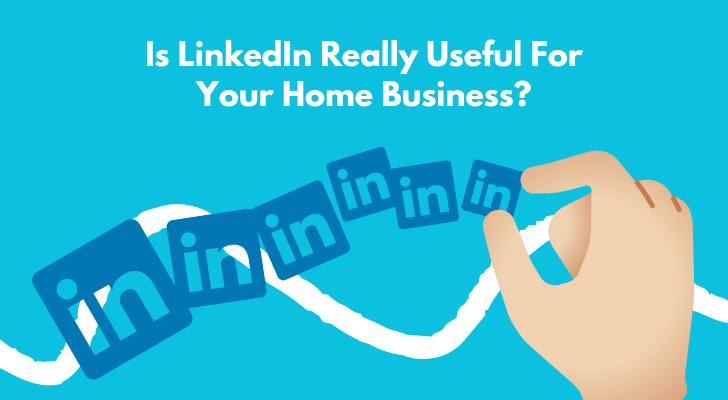LinkedIn, as you know, is a professional networking platform where you can connect, collaborate, and engage with others in their industry. It serves as a virtual hub for professionals, recruiters, and businesses to showcase their skills, seek job opportunities, and share industry-related content, fostering career development and professional connections...
...All sounds good, but is LinkedIn actually useful for your home-based business?

Who Are The Main LinkedIn Users and Why?
The main LinkedIn users can be categorized into several groups, each finding value in the platform for different reasons:
- Professionals: LinkedIn allows professionals across industries to showcase their skills, experience, and achievements through their profiles. They can connect with colleagues, industry peers, and potential employers, expanding their professional network and fostering new career opportunities.
- Job Seekers: LinkedIn is supposed to be good for job seekers. They can create a comprehensive profile, highlight their skills and qualifications, and search for job openings posted by companies and recruiters. Additionally, LinkedIn offers job search functionalities, including job alerts and recommendations based on users' skills and interests.
- Recruiters and Hiring Managers: LinkedIn provides recruiters and hiring managers with a vast pool of potential candidates. They can search for professionals based on specific criteria, such as skills, experience, and location. LinkedIn also offers premium recruitment tools that allow recruiters to directly contact potential candidates and manage the hiring process efficiently.
- Entrepreneurs and Business Owners: LinkedIn offers entrepreneurs and business owners a platform to promote their businesses, build brand awareness, and establish industry connections. They can create company pages, share updates, and engage with potential clients, partners, and investors. LinkedIn also offers targeted advertising options for businesses to reach their desired audience.
- Industry Influencers and Thought Leaders: LinkedIn provides a platform for industry influencers and thought leaders to share their expertise, insights, and opinions. They can publish articles, participate in discussions, and engage with a professional audience. This helps them establish themselves as industry authorities and expand their professional reach.
- Students and Recent Graduates: LinkedIn offers valuable resources for students and recent graduates. They can build their professional network, connect with alumni, and seek guidance from industry professionals. LinkedIn also provides access to internship opportunities, career development resources, and industry-specific groups for knowledge sharing and networking.
LinkedIn is good for each group because it facilitates professional networking, enables access to career opportunities, and promotes industry-specific discussions. The platform allows users to build and maintain their professional brand, establish credibility, and gain visibility within their respective fields. By connecting professionals worldwide, LinkedIn fosters collaboration, knowledge sharing, and career advancement.
Who Is LinkedIn NOT For?
It's a social media for professionals, so obviously, LinkedIn is not for casual social users or users with no professional aspirations.
But the platform is perhaps not for privacy-conscious users, either. You're prepared to engage in business transactions with others, therefore you must share your true background information publicly.
If someone is highly concerned about privacy and prefers to keep their professional and personal information separate, they might be less inclined to use LinkedIn.
How Can LinkedIn Help You Promote Your Home Business?
LinkedIn can be beneficial for promoting and growing a home business in several ways.
Let's say you have a home business that offers social media marketing services. Here's how LinkedIn can support your business:
Networking and Connections
LinkedIn allows you to connect with professionals in relevant industries such as marketing, digital media, and entrepreneurship. You can search for people who may be interested in your services, such as small business owners or marketing managers.
Showcasing Expertise
Use your LinkedIn profile to highlight your expertise in social media marketing. Include your experience, skills, and any relevant certifications. Share posts and articles showcasing your knowledge and insights in the field. This establishes credibility and attracts potential clients who are seeking social media marketing expertise.
Targeted Outreach
Utilize LinkedIn's search filters to identify potential clients based on specific criteria like industry, company size, or location. Once you've identified your target audience, craft personalized messages to introduce your services and explain how you can help them achieve their marketing goals.
Joining Relevant Groups
Join LinkedIn groups focused on marketing, small business, or specific industries you serve. Engage in discussions, provide valuable insights, and establish yourself as a knowledgeable professional. This can lead to connections and potential clients who are actively seeking social media marketing services.
Recommendations and Testimonials

Request recommendations from satisfied clients to showcase your work and build trust with potential clients. Positive testimonials on your LinkedIn profile can serve as social proof and demonstrate your track record of delivering results.
Content Marketing
Share informative and valuable content related to social media marketing on your LinkedIn profile and in relevant groups. This positions you as an industry thought leader and attracts potential clients who appreciate your expertise.
Partnerships and Collaborations
LinkedIn provides opportunities to connect with complementary businesses. For example, you can connect with web designers, copywriters, or graphic designers who may offer services that complement your social media marketing offerings. Collaborating with these professionals can result in mutually beneficial partnerships and expand your service offerings.
Avoid Cold Messaging
What's annoying about business-based community platforms is, everyone is focused on selling their services to others. They barely care about who you are or what you do.
It's not uncommon to receive direct messages on LinkedIn from users trying to sell their services, i.e. "LinkedIn Outreach" a.k.a. cold messaging. While senders may believe that they are sending valuable messages, unfortunately, most of those unsolicited messages are truly intrusive, wasting a lot of your time.
LinkedIn does provide guidelines and policies to discourage spamming and excessive self-promotion. Users can report inappropriate or spammy messages, and LinkedIn may take action against accounts that violate these guidelines.
If you find the volume of sales-related direct messages overwhelming or if you receive messages that are irrelevant or unprofessional, there are several steps you can take:
Adjust Privacy Settings

You can review and modify your privacy settings to control who can send you messages or connection requests. You can limit communication to only your connections or adjust settings to receive messages from specific categories of users.
Ignore/Delete Unwanted Messages
If you receive a message that does not align with your interests or needs, you can choose to ignore or delete it. LinkedIn does not require you to respond to every message you receive.
Use the "Report" Feature
If you receive messages that are spammy, inappropriate, or violate LinkedIn's policies, you can report them to LinkedIn. This helps the platform identify and take action against accounts engaged in spam or misuse.
Disconnect/Unfollow
If you find that a particular user consistently sends unwanted sales messages or engages in unprofessional behavior, you have the option to disconnect from or unfollow that user. This helps you maintain a more relevant and valuable network.
Clearly Communicate Preferences
In your LinkedIn profile or "About" section, you can communicate your professional interests, preferred modes of communication, and your openness to receiving sales messages. This can help set expectations for those who view your profile.
Avoid Sending Cold Messages

Therefore, you should avoid sending random messages to others at all costs. Focus on building genuine relationships and engaging with your network in a meaningful way. Here are some alternative strategies to promote your home business.
Build Connections Organically
Instead of sending cold messages, aim to build connections organically by engaging with people's content, participating in relevant discussions, and establishing a presence in your industry. This helps foster relationships based on mutual interests and shared connections.
Personalize Your Outreach
If you do reach out to someone you don't know personally, take the time to personalize your message and make it relevant to the recipient. Mention a common interest, or a shared connection, or highlight why you believe connecting would be beneficial for both parties. Personalization shows that you've done your research and adds a personal touch to your outreach.
Seek Warm Introductions
Leverage your existing connections to get introductions to users you're interested in connecting with. Ask your mutual connection to make an introduction on your behalf, providing context and establishing a level of trust from the start.
Show Your Interest
Engage with the content shared by your target audience by commenting thoughtfully, asking questions, and sharing insights. This helps you build visibility, establish yourself as a knowledgeable professional, and naturally attract interest from potential connections.
Provide Value
Share valuable content, insights, or resources that are relevant to your target audience. By consistently providing value through your posts and comments, you position yourself as a helpful resource and increase the likelihood of attracting meaningful connections.
Is LinkedIn Suitable For Affiliate Marketers?
Not really. It's not the most suitable platform for traditional affiliate marketers who primarily focus on promoting and selling products through affiliate links. This is because LinkedIn's primary purpose is professional networking and building business relationships, rather than direct product promotion.
Here are a few reasons why LinkedIn may not be the ideal platform for affiliate marketers:
- Professional Networking Focus: LinkedIn is primarily used for professional networking, connecting with industry peers, and building business relationships. Users are more inclined to engage with content that provides value, insights, and professional discussions rather than promotional affiliate links.
- Content Restrictions: LinkedIn has guidelines and policies in place that discourage excessive self-promotion and the sharing of promotional content. Affiliate marketing often involves direct product promotion, which may not align with LinkedIn's content guidelines.
- Audience Expectations: LinkedIn users typically visit the platform for professional development, industry insights, and networking opportunities. They may not be receptive to affiliate marketing promotions, as they may view them as irrelevant or intrusive within a professional context.
You might want to know that there are alternative strategies for affiliate marketers who wish to leverage LinkedIn more professionally:
Thought Leadership
Position yourself as an expert in your niche by sharing valuable insights, industry trends, and best practices related to your field. Focus on building your personal brand and establishing credibility within your area of expertise.
Relationship Building
Use LinkedIn to connect with professionals and industry influencers who are relevant to your niche. By building genuine relationships and engaging in meaningful conversations, you can expand your network and potentially attract opportunities for collaboration or partnerships.
B2B Affiliate Marketing
If your affiliate marketing efforts target businesses rather than consumers, LinkedIn can be a valuable platform. Focus on building relationships with decision-makers and professionals within your target industries to explore potential partnerships or referrals.
While LinkedIn may not be the primary platform for direct affiliate marketing promotions, it can still be a useful tool for networking, building your personal brand, and connecting with professionals in your industry. By utilizing LinkedIn strategically and adapting your approach to align with the platform's professional context, you may still find opportunities to support your affiliate marketing efforts indirectly.
How I "Finally" Make Over $7,000 Monthly Income
"The most valuable thing I've ever done!"


